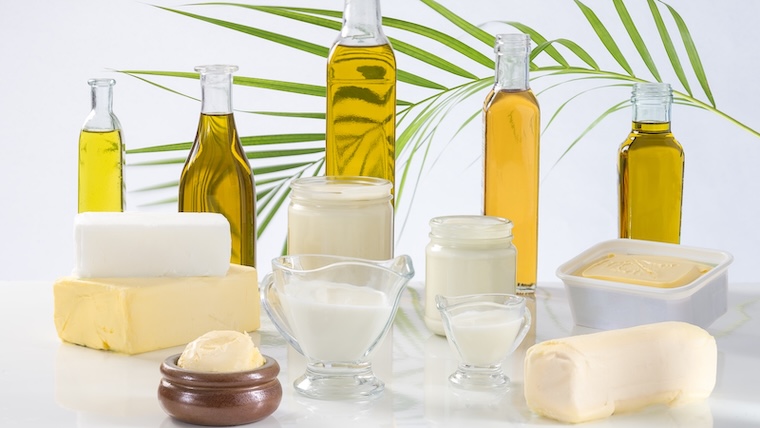Which is the healthier choice regarding cardiovascular disease, mortality, and cancer risk: butter or seed oils? Recent discussions raised concerns about seed oils, with animal studies suggesting they may increase inflammation and oxidative stress. Critics highlight the production methods of seed oils, claiming they introduce harmful impurities into the final product.
However, Dr. Layne Norton supports seed oils as a healthier option, particularly when compared to saturated fat sources like butter.
Animal Studies Vs. Human Trials
Animal studies using high doses of omega-6 fatty acids, such as linoleic acid found in seed oils, have demonstrated increased inflammation, oxidative stress, and other potential negative effects in rats and mice. However, research on the effects of seed oils in humans paints a different picture.
When used as a 1:1 replacement for saturated fats, seed oils have shown either neutral or positive impacts on metabolic health, insulin sensitivity, liver fat, cardiovascular disease, and even cancer in some cases. While not all studies highlight clear benefits, these compounds exhibit neutral effects in human studies.
[Related: What Happens If You Eat Too Much Protein?]
2025 Human Study on Butter & Seed Oils
Seed oil critics argue that comparing polyunsaturated fats to saturated fats oversimplifies the issue, as the context of the actual foods consumed matters.
A large-scale study examining the impact of butter and plant oil consumption on all-cause mortality tracked over 200,000 participants across a 33-year follow-up period. The findings revealed that higher butter consumption increased mortality risk by 15% to 40%, depending on the statistical model used. (1)
Ultimately, the researchers concluded that butter intake was associated with a heightened risk of death. Although butter consumption was also linked to greater risks of cancer and cardiovascular-related mortality, these associations didn’t reach statistical significance.
Plant & Seed Oils Decrease Total Mortality Risk (Except Corn Oil)
Plant oils were linked to a 16% lower risk of overall mortality, a 12% reduction in cancer mortality, and a notable decrease in cardiovascular disease mortality. Researchers analyzed various plant oils, including canola, olive, corn, safflower, and soybean oils, demonstrating protective effects against mortality, cardiovascular disease, and cancer.
One exception stood out: corn oil. While butter was associated with a 40% increase in mortality risk when analyzed through a specific model, corn oil showed a modest 9% increase in overall mortality risk. Compared to butter’s impact, corn oil’s risk appears relatively minor.
Study Conclusions
The evidence from human studies doesn’t support the notion that seed oils are uniquely harmful to health. Even when controlling confounding variables such as body mass index (BMI), smoking, alcohol intake, age, and physical activity, “If they were, at minimum, we’d expect to see no difference between butter and seed oils,” Norton explained.

This begs the question of the sources behind claims that studies on human outcomes show seed oils increase the risks of cardiovascular disease, cancer, and overall mortality. “They just don’t exist,” Dr. Norton emphasized.
Substitution Analysis Shows Similar Results
The study replaced butter with various plant oil subcategories, yielding results consistent with previous findings. Even when adding and removing confounders to the statistical analysis, the outcomes remained similar, reinforcing the conclusion that plant and seed oils generally have a more favorable impact on mortality risk.
Using a substitution analysis, seed oils have been a major source of calories in the American diet for the past 50 years.
Dumping oil on top of stuff, you’re increasing calories. Eating many foods fried in oil will cause calorie consumption overall, which is probably not good for you.
—Dr. Layne Norton
Study Funding Disclosure
The study was funded by the National Institutes of Health (NIH) through a government grant. While one of the authors did receive funding from the Dried Nut and Fruit Council, they weren’t involved in the study’s design or execution, ensuring impartiality.
This study is not an outlier. Numerous studies demonstrate that replacing saturated fats with polyunsaturated fats from seed oils can either neutrally or positively impact insulin sensitivity, liver fat, metabolic health, cardiovascular disease, and overall mortality.
More In Research
- Be Aware of These 5 Protein Myths
- Can Creatine Reduce Depression?
- Does Ozempic Negatively Affect Muscle Mass?
Reference
- Zhang, Y., Chadaideh, K. S., Li, Y., Li, Y., Gu, X., Liu, Y., Guasch-Ferré, M., Rimm, E. B., Hu, F. B., Willett, W. C., Stampfer, M. J., & Wang, D. D. (2025). Butter and Plant-Based Oils Intake and Mortality. JAMA internal medicine, e250205. Advance online publication. https://doi.org/10.1001/jamainternmed.2025.0205
Featured image via Shutterstock/JPC-PROD